The Secret to Picking Counters You'll Love Forever, According to a Pro
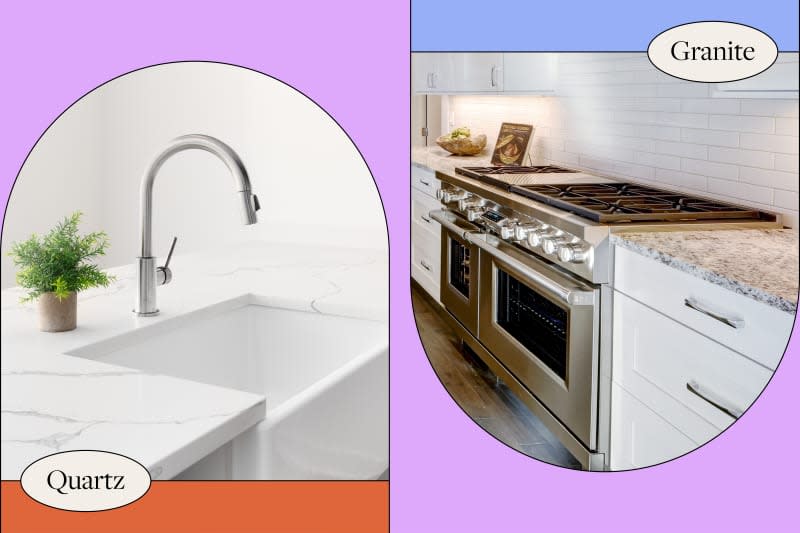
When embarking on a kitchen renovation or a bathroom remodel — arguably the priciest and most used rooms in a home — the stakes can feel high. You want to make the most of every square inch in a practical sense, with affordable kitchen cabinets or budget-savvy bathroom built-ins, but you also want to make every square inch reflect your personal style, too. Countertops are a big piece of this puzzle. You won’t just be thinking about where you’d like to put them, but you’ll be considering various countertop materials, too. Two popular options that homeowners often choose between: quartz countertops and granite countertops.
You might not think quartz and granite countertops have many distinguishing features. After all, they’re both hard surfaces that have reputations for being sturdy yet beautiful. But these materials have some distinct characteristics that make them better suited for different purposes.
If you’re in the process of determining which countertop is best for your renovation — quartz versus granite, the showdown — read on to get some insights from a professional. Hopefully, these tips will help you to choose the material in your dream space.
What to Know Before You Shop for Countertops
As tempting as it is to hit a big-box store or a slab yard, and wander through the available options, that’s likely not the best use of your efforts. Mallory Micetich, Angi’s home expert, says that sitting down and making a plan for what type of countertop you’re after will likely keep you calm and on budget through what is usually a stress-inducing splurge.
“Starting your kitchen renovations is an exciting process and the countertops will be a big part of the space, so it’s important to not get too caught up in the aesthetics and instead consider their practicality for you and your home,” she says.
Obviously, the first question you should ask yourself is simple (in theory, but not always in practice): What is your budget? “This will dictate the type of materials you can consider,” she says. According to HomeAdvisor, granite countertops cost between $2,250 and $4,500, with an average total of $3,250. Angi found that quartz countertops, on the other hand, can cost between $1,500 and $8,000, with the average being about $4,500. In terms of square footage, you can expect to spend between $40 and $100 on granite and $50 to $200 square foot on quartz.
As you run the numbers, Micetich notes that you should come up with answers for these next questions: “What is the design of your kitchen and where will the countertops be installed?” she asks. “And, will there be one type across your entire kitchen or will you be mixing and matching different materials?”
Take the time to measure where your counters will go in order to get a rough estimate of how much you’ll need and what it might cost. When you have a comfortable range in place, then it’s time to learn a thing or two about quartz and granite countertops specifically.
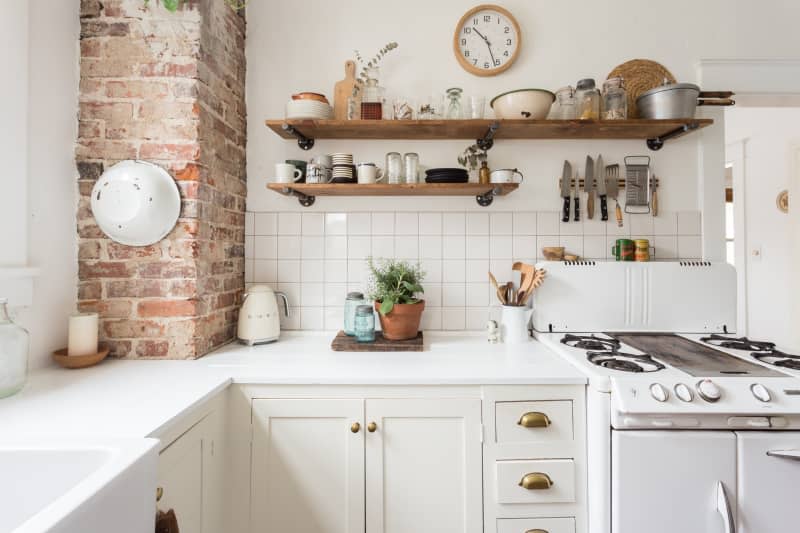
What Are Quartz Countertops?
Quartz countertops look convincingly like stone, but quartz countertops are actually man-made. The manufactured material combines quartz (the actual stone), resin, and pigment. Because quartz is an engineered stone, it has a wide range of available color and style options.
Quartz is available in styles that range from minimalist, with very little or even no “movement” (pattern) in the stone, to maximalist, with extensive movement and bold color.
You might have also seen quartzite countertops on the market. Unlike quartz, quartzite is a natural stone that’s extracted from quarries.
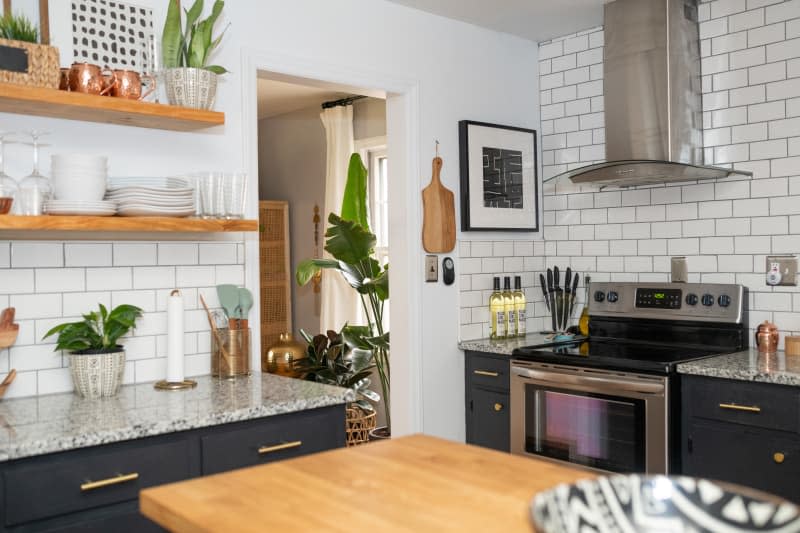
What Are Granite Countertops?
Granite countertops are made from 100 percent natural granite, a stone that’s formed after the cooling and solidification of molten rock. Granite is naturally composed of a mixture of materials, one of which is quartz.
While color variations in granite are more limited than in man-made stone, natural colorations do have a fairly wide range — everything from light gray to tan, pink, brown, and black. While the amount of “movement” in the stone can vary, granite will always have some amount of speckling thanks to its natural makeup.
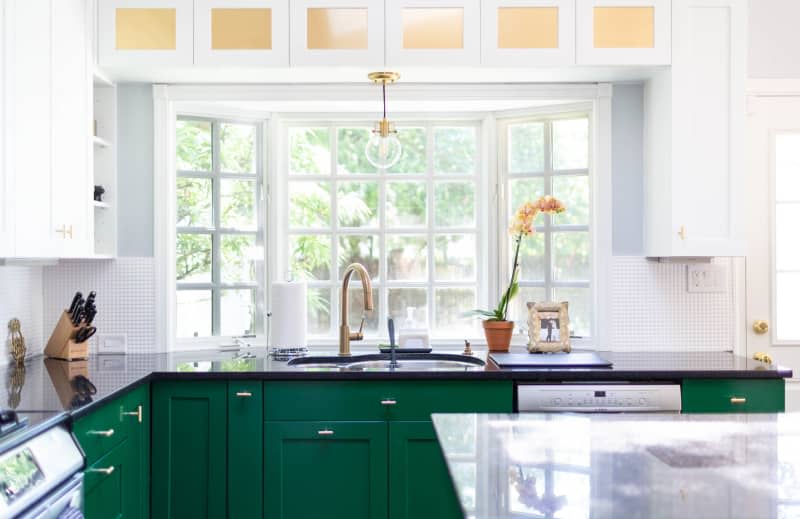
What Are the Advantages of Quartz Counters?
Quartz countertops are best for high-traffic, well-used kitchens because of their very low-maintenance characteristics. That’s why they’re so readily used in family homes.
“Quartz counters are made of crushed stone and formed into a slab with polymer resins,” Micetich says. “They have the look and performance of natural stone, but they’re non-porous, which means that it won’t stain or require sealing.”
Another positive? Quartz countertops come in a variety of colors, so it’s possible to pick one that’s on par with what you’ve envisioned. Their stain resistance means that they could sustain their pristine appearance over many years as well — lessening the fear of wine, juice, and coffee spills.
What Are the Downsides of Quartz Countertops?
If there are downsides, Micetich notes that quartz countertops can meet their match in excessive heat. “Most of the binding resins that are used in quartz aren’t heat-resistant, so you should use a trivet or avoid placing hot pans directly on the counter,” she says. “This stone can also fade over time if it’s exposed to direct sunlight, so it’s not a great outdoor countertop option. Additionally, silica, a compound that is highly present in quartz, can be hazardous to those manufacturing and installing the countertops.”
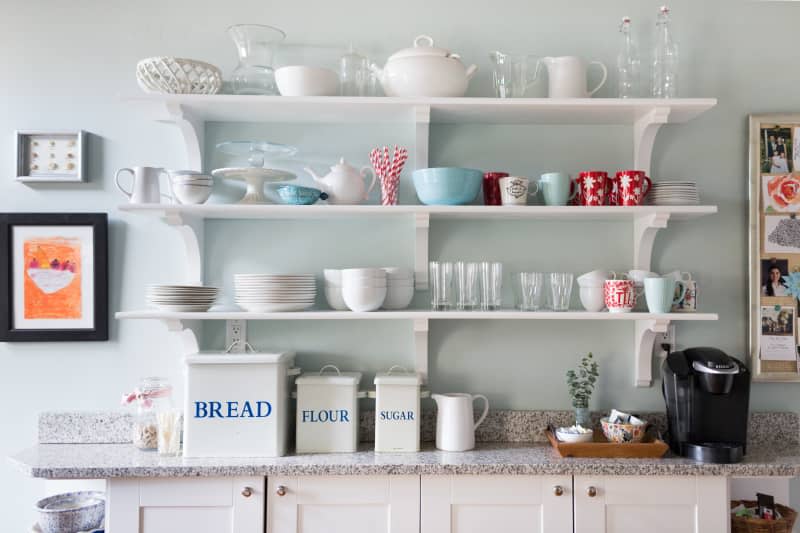
What Are the Advantages of Granite Countertops?
Granite has been a perennially respected countertop for decades given that it’s more budget-friendly than quartz but still provides a natural material that can complement many different design styles.
“A granite slab comes in a wide variety of colors and will often have flecks of matching colors inside,” Micetich says. “Some of the biggest benefits of using granite are that it is heat-resistant, has a unique pattern in each slab, and has a long lifespan.”
As Micetich mentioned, the heat resistance of granite can put it ahead of quartz for those who don’t want to worry about placing a hot pot directly on this surface.
What Are the Downsides of Granite Countertops?
Unlike quartz, granite is porous and requires regular sealings to keep out stains — at least once a year, and perhaps with the help of a professional.
“It’s also less durable than some engineered stones, and repairs can be difficult because the finish can be challenging to match,” Micetech adds.
This being said, granite may cost less than quartz up front but end up costing more to maintain in the long run. It all depends on how often the countertops are going to be used, and whether they will be well cared for over the years.
How to Choose Quartz vs. Granite Countertops
Micetech says that when it comes to choosing budget-friendly countertops for a kitchen or bathroom, you can’t go wrong between either quartz or granite. And yet, if you’re still unsure about which one to pursue, here’s her final thoughts on the matter:
“While quartz is generally a bit more expensive than granite, the benefits that quartz provide in maintenance might be worth it if you have a young family or host a lot of parties,” she says. “However, if you highly value a natural stone look and the grain that comes with granite, then you may want to prioritize it and the extra maintenance of resealing and cleaning it. In this case, the granite will be worth it.”
Since Micetech won’t be footing the bill for this project, her last words come down to how comfortable you are with putting your wallet to work. “Ultimately, I think this is one area where budget should be the chief consideration given the pros and cons of both types of countertops,” she says.

